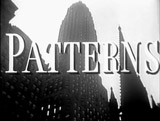
|
Patterns (1956)
In director Fielder Cook's drama that was originally
produced as a teleplay written by Rod Serling (who became
well-known after the debut of his 5-season TV series Twilight
Zone beginning in 1959); the teleplay first aired on NBC's The
Kraft Television Theatre in early 1955 before it was adapted
by Serling and produced as a feature-length film, following in the
footsteps of a similar teleplay that became a successful film - Marty
(1955). The B/W drama was filmed in a Brooklyn studio and
on-location in NYC. It was followed by Billy Wilder's acidic The
Apartment (1960), and emulated decades later by AMC's Mad
Men episodic
drama series.
This boardroom-office urban melodrama
(without a musical score) - about a back-stabbing
power struggle and ladder-climbing within corporate big business
("survival
of the fittest") and 'gray flannel suits' - was similar in plot
to MGM's Executive
Suite (1954). It featured the sensationalist tagline about
the lack of corporate morality: "Ruthless
Men And Ambitious Women...Clawing For Control Of A Billion Dollar
Empire!!!" Another tagline was: "PATTERNS OF PASSION... PATTERNS
OF GREED...PATTERNS OF LUST...that shake the gray flannel world of
'big money' like an earthquake!"
- the film opened with title credits, including
imposing low-angled views of NYC and its spectacular, over-powering
skycrapers that dwarfed viewers from below; the industrial giant
Ramsey & Co.
(with its executive structure outlined on a building directory)
revealed that the high-powered corporation was on the top 40th
floor of the Ramsey Building skyscraper; its kingly head was ruthless,
menacing, callous, and harsh profit-driven business executive Walter
Ramsey (Everett Sloane); his assistant general manager was aging,
62 year-old, long-time executive VP William "Bill" Briggs
(Ed Begley) of over 30 years - he was one of the corporation's
founders with Walter's father Jim Ramsey
- Ramsey's cool, no-nonsense, all-knowing and efficient
head secretary was introduced - Miss Margaret Lanier (Joanna Roos);
she was assigned to prepare for the arrival of a new employee
- in the film's early scenes, it was revealed that
a young and ambitious rising star - production engineer Fred Staples
(Van Heflin) had been newly-recruited from the small-town of Mansfield,
Ohio, where he had worked for six years at Queen City Tool & Die
when his company had been acquired by Ramsey; Fred had relocated
to a new suburban country house with his ideally-suited, social-climbing
wife Nancy (Beatrice Straight)
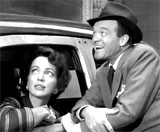
New Hire Fred Staples (Van Heflin) Arriving With His Wife For First
Day of Work at Ramsey & Co. |
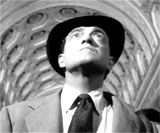
Fred Staples Overwhelmed in Lobby of Immense Ramsey Building
|
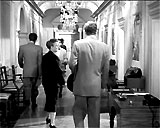
The Extravagant 40th Floor Office Corridor
|
- Fred arrived for his first day of work when his
wife dropped him off outside - both were overwhelmed
by the immense towering Ramsey Building before them; he noted hopefully:
"A little different from Mansfield, isn’t it?... Gimme
a chance, honey, maybe I can cut it down to my size"; after
he entered the grandiose lobby, a low-angle shot emphasized the
enormity of the place; after taking the Tower Elevator to enter
the upper offices, he was shown his own luxurious, recently-redecorated
private office
- he met the personable, kind-hearted, positive-thinking,
genial, ethical and honorable VP Briggs who had just returned from
sick leave; he was suffering from medical issues related to heart
problems and an ulcer; Fred expressed immediate amazement to Briggs
about how he was slightly taken aback by everything: ("You
come out of a small town plant, you-you feel a little lost in a
place like this")
- Bill's faithful secretary Marge Fleming (Elizabeth
Wilson) for the previous seven years was told that she had been
permanently reassigned to Staples through an order by Mr. Ramsey,
without Bill's prior knowledge - she was devastated and struggled
with her decision to either stay or resign; it was beginning to
dawn on Briggs that there was an underlying strategy
to replace him
- in a board meeting in the conference
room headed by Ramsey, one of the film's earliest contentious issues
became evident during a discussion of the brutal, heartless planned
purchase proposal of a bankrupt company in the small village of
Williamston; Briggs was the sole voice to disagree with Ramsey
when he mentioned that the plant employed 900 men - half of the
inhabitants of the town, and that the acquisition would decimate
the community for 6 months until the men were rehired; Ramsey counter-argued
that more than 900 men would eventually be hired: ("We're
not going to ruin that town, we're goiing to make it!") and that
it would help the corporation's bottom-line
- he also insulted Briggs
with a tongue-lashing about not having an original idea or point-of-view
in his head for many years: "I should think, Mr. Briggs, that after
30 years, you'd be able to think beyond the tongue-clucking stage
and come up with something resembling an analytical point-of-view";
on the other hand, Ramsey complimented Staples for his thoughtful
response - that he would pass on making a judgment until he knew more
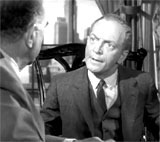
Ramsey's Tyrannical Belittling of Briggs During a Conference Meeting
|
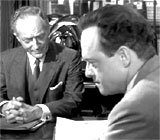
On the Other Hand, Ramsey Complimented Staples
|
- after a party at the Staples' home, Fred experienced
his first conflict with Mr. Ramsey in his home's library; after
Fred was praised by Ramsey for his work on a project, Ramsey wouldn't
accept Fred's claim that Briggs had collaborated with him:
("This isn't his style, it isn't his brand of thinking...Don't
take half of your accomplishment and hand it out gratuitously to
the man on the left who hasn't the stuff to do it on his own. That's
charitable, humane, it makes you feel good, but it's not business")
- when Fred defended Briggs as a "good man," Ramsey
reminded him that Briggs' time was up and long overdue, like an
antique: ("Grandfather clocks were good clocks, and Stanley
Steemers were good automobiles, but you can't run them in competition
today");
Ramsey blurted out the truth - that he was openly grooming Staples
to replace him: ("Fred, you're Briggs' replacement! I thought
you understood that. I'm expecting his resignation... You didn't
steal that promotion, you won it!")
- unable to fire Briggs due to his seniority, it was
clear that Ramsey's tyrannical and devious plan was to degrade,
sabotage and exasperate Briggs by bringing him to the brink of
resignation or retirement rather than firing him, for reasons related
to his poor health and his old-fashioned inability to adjust to changing
times; Fred
began to realize that he had been brought in by the demanding Ramsey
to eventually replace Briggs as soon as possible - not just as an industrial
relations manager but as VP
- after Ramsey departed from the party, Fred explained
to his wife how appalled and surprised he was that he had been
misled and lured to NYC to replace the current VP - and that he
disliked how it was being handled: "I don't like stepping
on another human being to get to a capital gains bracket. Ramsey
stalking that poor guy like an animal. He'll whip him to death
if he could to make him resign" - but then Fred made the startling
confession to his wife that he actually wanted the position: "I
want the job"
- in a sub-plot about Briggs' family, for years, teenaged
son Paul Briggs (Ronnie Walsh) had been neglected and displaced
by his father's workaholic hours; Briggs had often forgotten about
promises to his son to attend ball games together, and now he had
missed a double-header the previous night
- that evening at work,
Fred found an exhausted Briggs working late (and drinking) in his
office after sending Paul to the ballgame by himself; Briggs was
distraught and worked up over the direction the company had taken
years earlier; he rhapsodically praised founder Jim Ramsey, but
dismissed Ramsey's "barracuda" son as a "spindly little financial
wizard, this wall-eyed, ice-coated little rooster who knows more
about debentures than he does about the human heart" - the exploitative
Ramsey had overtaken the company with sharpster financiers;
in his opinion, the company's original principles of decency and
humanity had been compromised and thoroughly destroyed
- when Fred suggested that
Briggs might resign to avoid being fired, Briggs told him about office
policy: "On
our level you don't get fired, you know that. After thirty years
of productive work, they can't say to a man like me, 'Alright, now
get out!' They just can't do that. So what do they do? They create
a situation. A situation you can't work in and finally that you can't
live in, with this tension, abuse. Small humiliations. It all starts
out on a scale so subtle, so microscopic that at first you can't
really believe it's happening at all. But gradually the thing begins
to take shape. The pieces fit together - all the little bits. And
it becomes unmistakable. They chip away at your pride, your security
until you begin to have doubts, and then fears"
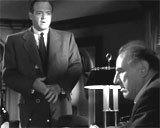
Briggs Found by Staples Working Late at Night - Distraught Over the Direction
of the Company
|
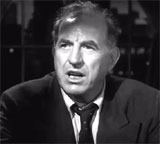
Briggs' Monologue About How He Was Being Pushed Out
|
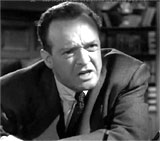
Fred Begging For Briggs to Quit
|
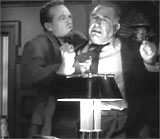
Briggs' Crazed Dream of Striking Out at Ramsey
|
- Fred begged for Briggs to quit, but he adamantly
refused as he pounded his fist:
"NEVER!"; Briggs explained why it would be foolish to quit
at the age of 62 - because he wouldn't be a good worker any more:
"Because I'm weak, I guess" - and he wouldn't be able to find another
job; he became crazed as he described a dream of calmly being in
a conference room and then "smashing" Ramsey multiple times; they
were interrupted when they heard Paul arriving in the hallway; Fred
kept it a secret that Briggs was there, and offered to drive Paul
home
- a series of incidents had already occurred in which
Ramsey treated Briggs with condescension and degradation and stressfully
humiliated him; another tense confrontation between
them in the conference room saw Ramsey refusing to give credit to
Briggs for his combined effort and joint contributions to Staples'
Portland projects proposal report (Briggs' name had been crossed
off); when both Fred and Briggs objected, Ramsey concluded the discussion
with an undercutting jab: "Now then, if Mr. Briggs' ego has been
sufficiently nourished...," but Briggs
refused to be downgraded by Ramsey's "calculated discolorations
of a man's worth"; Ramsey continued to pursue Briggs when
he cruelly demeaned all of Briggs' work: "Your work hasn't shown
this stamp of originality and talent in ten years. A man slips, clutches,
he loses his grip, he tries to hang on by someone else's"; Ramsey
followed his volatile criticisms of Briggs by suggesting that he
step down, but Briggs declined to comply
- then
shortly later after the meeting was adjourned, Briggs collapsed in
the hallway (filmed from his wavering and bleary-eyed POV), was taken
away in an ambulance, and soon died of a heart-attack; Briggs'
forlorn former secretary left her desk (and job forever) with the
desk plant
- in the film's final ten minutes, it was now Fred's
turn to be outraged by Ramsey's brutal treatment
of Briggs that led to his demise; he had been drinking in a bar outside
the hospital,
grieving Briggs' death, and his first inclination was to quit and
start packing; when he returned to the office, Fred
refused a trip to Lansing in Briggs' place, and he angrily told Ramsey
how he truly felt: ("I
don't want the job. I'm through, I'm quitting, I resign as of now...Because
I hate your guts. You used Bill Briggs for a whipping boy. You
made him knuckle under, and then you beat him to death. You wouldn't
try anything like that with me because I'd kill you first");
Ramsey admitted that he was indeed a despicable human being: ("I'm
not a nice human being")
- Fred continued to argue with Ramsey and criticize
his lack of sympathy: "You're
nothing but a freak. You drive your people into peak efficiency
if they can make it, or a grave if they can't. Because Bill
Briggs lacked the strength..."; in a stunning rebuke, Ramsey
described how one had to be ruthless to succeed in business, and
Briggs had failed in his responsibilities: ("He was second
in command, he had a lot of responsibility to hold and he cracked...It's
no one's business. It belongs only to the best; to those who can
control it, sustain it, nurture it, keep it growing. Right now it
belongs to us because we're producing. But in the future, it belongs
to whoever has the brains, the nerve, and the skill to take it away
from us");
Fred rejected Ramsey's implication that he would now be replacing
the failing Briggs:
"I don't want any part of it"
- Ramsey continued to reason with the resistant Fred
and tempt him to stay by offering him a challenging position in
the corporation: ("What do you want from me? Apologies? I
don't apologize. What else? A nice unsullied conscience? You walk
out of here with a halo because you spoke your mind? What do you
do then? Go to work for some nickel and dime outfit run by nice
people who won't challenge you and prod you and goad you and drive
you to a height you never even dreamed of? A company where there's
nothing to fight for because you're the best and there's no competition?
Where everything is handed to you and nothing is worth fighting
for? I want you to stay")
- however, Fred was fed up with Ramsey's attitude
and personal callousness: ("I don't think you understand, Ramsey.
I don't like you. I don't like anything about you"); although
the two hated each other, Ramsey knew he could get the embittered
Fred to remain at the corporation by offering him a way to realize
his full potential and find happiness: ("...whatever I am, you'll
learn more, grow more, and do more here with me than anywhere else
on Earth. I want you to stay because I need help on my level. And
you're the only one who's able to function there. Be a conscience
for me if you want. Be anything you like. And if it's something I
don't like, you'll know about it soon enough. I think you're strong
enough to take it. And if not, I think you're strong enough to get
out")
- the ambitious-minded Fred was
enticed to take Bill's place and 'name his terms', and although he
was terribly upset by the whole situation, he was tempted by Ramsey's
offer of a double salary, stock options, and an unlimited expense
account: ("As
of now, your salary is doubled. Your stock option is doubled right
down the line. Your expense account is whatever you make it. Add
to that a new title, vice president")
- Fred negotiated and threatened
that he would never allow Ramsey to abuse him, and would never
give Ramsey any peace as his second-in-command, because he would
be angling for his top job: ("I want a lot
more than that. You're not going to take me on as just another
Vice President you can push around. You take me as someone who
hates you down to the bare nerve. Nothing in the world will ever
change that. I'll argue with you, contradict you, fight you
every way I know how. I'll do everything in my power to push you
out and take your place myself"); Staples
surrendered and decided to accept the now-vacant secondary VP position,
and the deal was agreed upon
- Fred also added one vengeful reservation - and
wanted it added to his contract: ("Bill had one pitiful
little dream that someday he'd walk in here and break your jaw.
I reserve the right to have that wish for myself"); Ramsey countered
him: ("I'll have it drawn into the contract, with a little rider
giving me the same privilege"); they now were pitted against
each other: "It begins!"
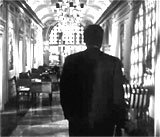
|
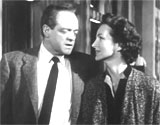
|
|
Exiting from the Ramsey Building - "Satisfied"
|
- as Fred walked down the office corridor, he
felt that he had properly challenged Ramsey and proved
his worth; he met his wife in the lower-lobby, and told her that
he was "satisfied" with the outcome and that they wouldn't be moving;
he was confident that they would be staying on his terms, not
realizing that sooner or later, he would also follow the "pattern" of
being victimized, discredited and belittled by the system
|
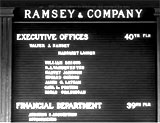
The Ramsey Building Directory
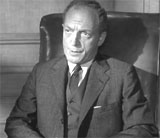
Walter Ramsey (Everett Sloane) - Business Executive
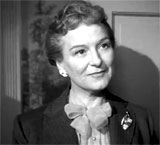
Margaret Lanier (Joanna Roos) - Ramsey's Secretary
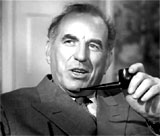
VP William "Bill" Briggs (Ed Begley)
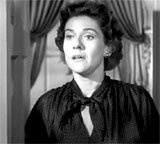
Marge Fleming (Elizabeth Wilson) - Briggs' Faithful Secretary
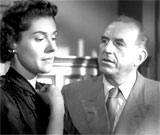
Marge Devastated That She Had Been Permanently Reassigned to Staples
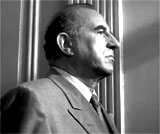
Briggs Realizing That His Time Was Limited
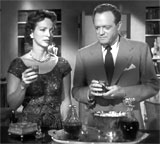
Staples Discussing His First Day of 'Office Politics' With Wife Nancy
in Suburban Home
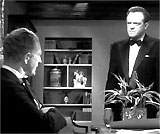
Fred's First Conflict with Mr. Ramsey - and Ramsey's Admission That
Fred Was Brought to NYC to Replace Briggs
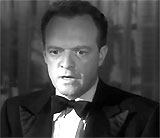
Fred to His Wife Nancy: "I want the job"
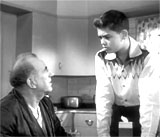
Briggs with Neglected Teenaged Son Paul
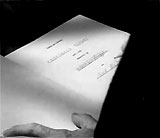
Ramsey Crossing Off Briggs' Name on Proposal Report - Refusing to Give
Him Credit
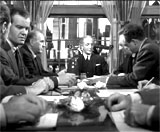
Ramsey Chairing the Board Meeting
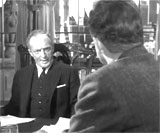
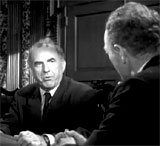
Ramsey Praising Fred For Report and Neglecting Briggs
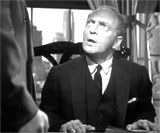
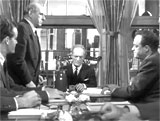
Ramsey's Suggestion That Briggs Step Down
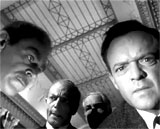
Briggs' POV - Collapsed in the Hallway
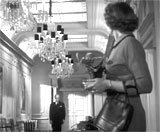
Briggs' Former Secretary Leaving the Office
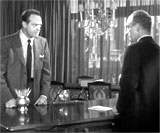
Showdown Between Staples and Ramsey
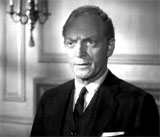
Ramsey: "I'm not a nice human being"
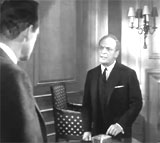
Ramsey to Staples: "I want you to stay"
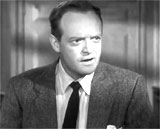
Staples to Ramsey: "I don't like you"
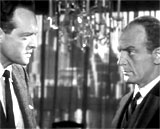
Ramsey's Offer of Higher Salary, and the VP Position and Staples' Rebuttal
- With Reservations
|

